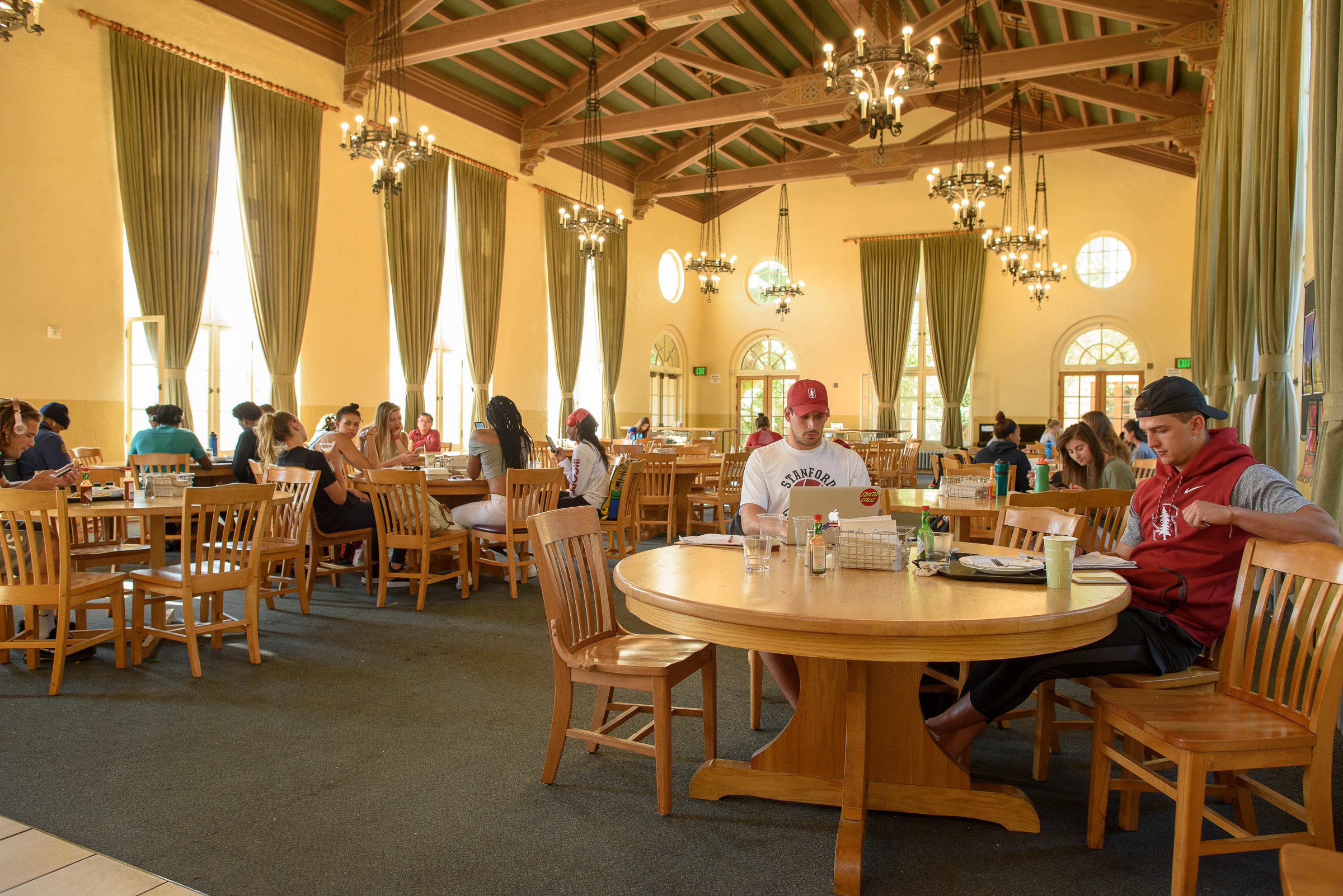Students pressed President Marc Tessier-Lavigne and Provost Persis Drell on issues ranging from coronavirus to racism at an informal conversation Tuesday night, co-hosted by the Associated Students of Stanford University (ASSU). Tessier-Lavigne and Drell emphasized their continued interest in working with students on campus issues but that change could come slower than students would hope.
At the event, students wrote questions on notecards that were passed to Tessier-Lavigne and Drell. Other University administrators, including Vice Provost for Academic Affairs Stephanie Kalfayan and Vice Provost for Student Affairs Susie Brubaker-Cole, were also present to respond to questions.
The event was hosted as an informal dessert conversation at Branner Dining as opposed to a structured town hall to make it more accessible to students both in location and timing, said ASSU Vice President Isaiah Drummond ’20 in a statement to The Daily.
“Without a doubt, we believe that this [conversation] exceeded our expectations and provided the framework for future successes,” Drummond wrote.
University readies for coronavirus
One student asked via notecard whether Stanford was prepared to handle a coronavirus outbreak. Coronavirus is a disease that originated in Wuhan, China and has now infected over 6,000 people globally. On Wednesday, China reported 132 deaths in the country, but no deaths have been reported outside of China. There are currently two reported cases in Southern California, with no reported cases in the Bay Area or Santa Clara County.
Tessier-Lavigne said the University discussed the issue and potential University responses at its daily group meeting, as a case could “show up any day.”
“We don’t want to get ahead of ourselves,” Tessier-Lavigne said, warning of the dangers of creating a panic across campus, “but we are remaining vigilant.”
Kalfayan spoke to concerns raised in a student question regarding travel to and from China. Countries have issued warnings regarding travel to China, and some airlines have halted flights altogether.
Kalfayan said that non-essential travel restrictions were designed primarily to prevent an “overtaxing of the medical system in China,” not to prevent the spread of the disease.
Tessier-Lavigne said that while he was not aware of any students who had been prevented from traveling back to the United States from China, the University had legal personnel ready to assist students.
‘The future is diverse’
Tessier-Lavigne and Drell also fielded concerns about diversity and inclusivity. Both affirmed their commitment to increasing the presence of diversity at the University, but hedged their responses toward student concerns regarding faculty diversity, community center funding and recent racist incidents.
“Just look around this room,” Drell said. “The future is diverse.”
Drell noted that change could not be immediate. She pointed to the average length of a faculty member’s career, the lifting of the retirement age and the high cost of living in the Bay Area as factors that slowed the University’s ability to hire more diverse faculty members.
In response to a question about campus community center funding, Drell said that increasing funding could be difficult.
“We are anticipating announcing some affordability measures for our staff, our faculty and our graduate students,” Drell said. “So the budgets that were allocated for next year are a little tighter than in the past.”
Drell than passed the question to Brubaker-Cole who confirmed that community center budgets would not be reduced.
Following a question about recent racist events on campus, including a July noose hung near a student residence, Drell said she was at a loss for a solution that could fully fix the problem.
“I believe that we as a community can and should do better,” Drell said. “But I only know how to do it by leading by example. I’m open if someone has an idea on how we could be better there to proactively stop these incidents.”
Future of Greek life
Tessier-Lavigne and Drell received multiple questions about the continuation of Greek life on campus. Last spring, Brubaker-Cole said the University would maintain 10 Greek houses. There are 26 Greek chapters on campus.
Brubaker-Cole said the 10 house cap was a decision made to make Row housing more open to all students, characterizing Row housing as “the most premium housing on campus.”
She added that “Stanford is not trying to get rid of Greek life, period.”
Brubaker-Cole also responded to a question about resources available to students planning social events.
“There is an inherent risk in planning social events,” Brubaker-Cole said, recommending that students talk to the Office of Alcohol Policy and Education and the Office of Student Engagement.
She also said the campus needed to take seriously the threat of “tainted drugs in the Bay Area and our campus.” In September, the County of Santa Clara Public Health Department issued a warning about fake pills resembling prescription medications containing fentanyl, an opioid 80 to 100 times stronger than morphine.
Drell poked fun at her presence at Kappa Sigma’s fall Eurotrash party.
Drell said, “I thought people didn’t want to plan social events because they were afraid the Provost would attend them like she did at Eurotrash.”
“And I wasn’t invited?” joked Tessier-Lavigne.
Turning the battleship
Drell closed the conversation by reminding students that campus change could be slow.
“When you want to make change at the University, it’s a bit like turning the proverbial battleship,” Drell said. “Be realistic and realize that sometimes change is not going to happen as fast as you want. But keep your patience; I’m impatient to work together.”
Another conversation with the President and Provost will be held at Tresidder Union Oak Lounge at noon on Thursday.
